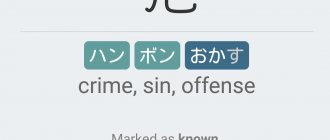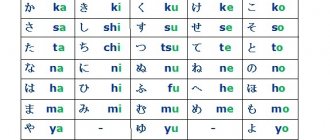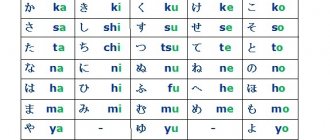List of tutorials
- “Reading, writing, speaking Japanese” , authors Strugova and Sheftelevich. The textbook contains the most necessary materials and topics for learning Japanese - tests, practice, grammatical explanations, hieroglyphics lessons, as well as copybooks.
- “Japanese for Beginners” , author L. T. Nechaeva. This textbook is popular in educational institutions for its competent presentation of material and a lot of exercises. Excellent explanation of grammar is a clear plus of this manual.
- "Modern Japanese Course" by Hiroko Storm. This textbook does a great job of teaching grammar. It is well structured and provided with audio materials.
- Minna no-nihongo . This textbook is written entirely in Japanese and includes several types of aids. There is even an addition on writing essays, on hieroglyphs, a book for reading and other materials.
Do you love anime and want to watch without subtitles? Do you like manga and dream of reading the original in Japanese someday? Do you watch Japanese dramas every day and want to understand what your favorite characters from Japanese TV series are saying without translation? Do you want to travel around Japan and communicate in Japanese with Japanese friends? Do you love j-rock and want to sing along without an accent? Do you dream of going to study in Tokyo? Or maybe you plan to live and work in the Land of the Rising Sun? Do you want to develop business with Japanese partners? Or maybe you are attracted to the culture of Japan, from ancient traditions to modern art?
Attention! Changes have been made to the public agreement. The new edition comes into force on May 21, 2021. Please read the new text of the public agreement.
Sign up for courses
WHAT DOES THE ONLINE JAPANESE LANGUAGE COURSE CONSISTE OF?
1. Free materials for lessons. For classes you will only need a computer and Internet access; you will receive all educational materials in electronic form.
2. Access to your personal study account. We will send you login details to your account with educational materials. You will be able to receive and submit homework and tests for review, listen to audio recordings and watch video materials at any convenient time. Access to all training materials is maintained throughout the course.
2. Online lessons with a teacher. You can study with a teacher individually or in a group. Group classes are held in the format of online conferences; the group can be small (3-5 people) or large (6-10 people or more). During online lessons, you and your teacher will practice exercises, read texts, receive recommendations and comments, and also be able to ask questions regarding learning points. The number of available online lessons (as well as their duration) depends on the selected service package.
3. Checking homework and tests with a discussion of errors. Your progress in learning Japanese will be constantly monitored. This way you can consolidate your knowledge, correct mistakes and study effectively.
1. The curriculum was developed by a native speaker. Furusawa Akira has been a teacher of Japanese at the Belarusian State University since 2000, and since 2010 he has been the founder and teacher of the Center for Oriental Languages. Extensive experience in teaching Japanese to Russian speakers allowed Furusawa Sensei to develop an effective methodology.
2. The content of the online course is not inferior to face-to-face classes. An online Japanese course differs minimally from offline classes. Distance classes are built on similar principles, the only difference is the format of the classes.
3. Studying online is easy and convenient. It doesn’t matter where you live - in the capital, small town or village - online lessons will take place where your computer is located. You don’t have to think about how to combine courses with study or work, and you don’t have to waste time on the road. You will be able to study in a comfortable environment for you.
3. Fair price. We do not overcharge our online classes to ensure that they are accessible to everyone who wants to learn Japanese. In turn, the quality remains at a high level. For convenience, the cost of classes is pegged to the dollar exchange rate.
4. We teach correct, living Japanese. The center's teachers will teach you correct and up-to-date Japanese. By completing all the tasks provided in the online courses, you will receive strong basic knowledge that you can further develop. You won't look stupid in front of native speakers when speaking Japanese.
5. Our online courses are “little Japan”. Here it is very important to behave as in Japan: to be polite and disciplined, to absorb the knowledge that the sensei gives, and not to strive to show off your own. Our students who take up jobs in Japan are appreciated everywhere not only for their correct Japanese, but also for their correct behavior.
Take a step towards your dream and start learning Japanese at the Center for Oriental Languages right now!
SUBMIT YOUR APPLICATION
Dictionaries
YARKSI - this site is recognized as one of the best Japanese-Russian hieroglyph dictionaries. You can download it to your smartphone or computer, and you can also find the hieroglyph by simply drawing it with your finger!
Warodai - this site took Conrad's dictionary as a basis and compiled it into an electronic version. The volume of words is about 150 thousand; The dictionary can be downloaded in different formats.
Kanjiname is a convenient dictionary divided into topics and categories.
Applications
busuu - this application has a huge number of users around the world and offers learning a foreign language without any extra effort. However, please note that the service is suitable as support for language learning, but not the main material.
memrise - this service is aimed at practicing vocabulary in learning foreign languages, in particular Japanese. There are many exercises here to help you maintain your practice at any time.
Learn Japanese - the application will help you quickly and easily get to know the language. It was developed jointly with the Japanese, so the accuracy of the translations is ensured.
Websites
Japanese language online - the site contains a good selection of materials for learning: grammar, videos, vocabulary for levels from beginner to advanced. You can also prepare for exams separately and read interesting articles about Japan.
Krakozyabr - the portal contains useful materials on grammar, vocabulary, punctuation, and hieroglyphs. There are texts to read in Japanese.
Ninna no Nihongo - we have already mentioned this portal above. There is a huge database of materials on all aspects of language in theory and practice. The resource offers lessons, preparation for exams, and studying a database of hieroglyphs.
First lessons from Naoe Nagonuma - this site has a selection of 40 basic Japanese lessons. Classes are constantly updated.
Orient Express - a site dedicated to the culture of the Land of the Rising Sun. There are materials related to culture and traditions, as well as lessons, reference tables, textbooks and audio recordings.
Websites to help Japanese language learners
Websites to help Japanese language learners
Today it was decided to make a selection of sites for learning Japanese. For simplicity (as well as brevity of the information provided), all sites will be accompanied by: level of Japanese and what the site is intended for (for example, reading, entertainment, etc.)
Below is the list:
Cool sites for learning Japanese:
newsinslowjapanese.com
Level: N3 and above
Why: listening training on a wide variety of topics. It has 2 speeds: slow (closer to level N4) and fast (closer to level N3). In terms of vocabulary, some news from level N3 and above
bitesizejapanese.com
Level: N5 and above (knowledge of English is required)
For what: listening and speaking training. A collection of simple, common expressions that can be used in everyday life, especially when you are just starting to speak Japanese. At the moment the site is not opening, if this continues, this site will be excluded from the list.
www.tanos.co.uk
Levels: all (but knowledge of English is required)
For what: training and study of grammatical structures, however, discrepancies with the latest textbooks for preparing for the JLPT are quite possible. The site is missing some constructions, and also does not touch upon the topic of common constructions in Japanese conversation. Another disadvantage is the translation, we can interpret it in our own way. Therefore, for better preparation, it is still better to use textbooks printed in Japan and consult the question boards, which will be discussed below.
日本語の森. Video channel and website
Levels: It is better to start with N3 and above. Good knowledge of basic Japanese is required
Why: Studying Japanese grammar from A to Z. All forms, differences between similar designs, video tutorials. Everything you need to prepare for the JLPT. Also on the video channel there are tips on listening, vocabulary and reading.
J-CAT
Level: N4 and above (knowledge of English preferred)
Why: before preparing for Norok, I really want to test my knowledge. At least a year, or better yet six months before passing the desired level, you can register on the website and take a simulation test. Very useful, especially if you don’t have series like スーパー模試 at hand
Jgram.org
Level: N5 and above (good knowledge of English is required)
Why: Grammar, grammar and more grammar to prepare for Norok. The disadvantages are the same as those of Thanos: sometimes the nuances of use are not conveyed, there are moments in which advanced levels have doubts (about the use of similar grammatical structures), and such moments are not well covered or are not given at all.
Renshuu.org
Level: N5 and above
For what: grammar, grammar and grammar again. There are a lot of examples here, a more structured base. Although, it happens that you come across examples from users who go against the nuances given in official publishing houses (several times I caught in grammatical forms N2-N1、 that the nuance of an example from a user was given incorrectly, I had to fray my senses’ nerves). Therefore: Be careful with examples from users (on the site, reference examples and user examples are separated for a reason)!
japanesetest4you.com
Level: N5 and above
For what: grammar and imitation tests of the Japanese language. Much is built on the basis of the publications of 日本語総まとめ、新完全マスター (many examples from these textbooks were found on the site), so you can be relatively calm about the reference part. It would also be very, very good to take a look at the tests section of this site.
Maggie-sense website
Level: any, but you need to know English well
For what: studying grammar, constructing phrases from the native language. The biggest advantage of the site is that grammar is not divided into levels, and that even its branches are covered (for example, how it sounds in colloquial or gender variants). Another plus is that the student can get acquainted with the basics, as well as “looking ahead,” immediately (the transcription is also given in Latin).
Tae-Kim
Why: studying grammar and vocabulary at all levels, just like with Maggie’s website you need to know English very well
Why: studying grammar from “あ” to “ん”. Different levels, different nuances, quite simple and accessible examples. However, many already know that Tae Kim is a leading resource for learning the Japanese language
s-manga.net
Level: N3 and above
Why: reading living Japanese. For manga lovers. Training of colloquial and slang expressions of the Japanese language. Enrichment of vocabulary with all possible and impossible neologisms of Japanese *)) In general, it’s not boring for those who like to read.
https://anime-manga.jp/
Level: N5 and above.
Why: Japanese language training for manga and anime lovers.
erin.ne.jp
Level: N5 and above
Why: training first communication skills, consolidating the completed structures in courses such as Minna no Nihongo and Marugoto. Interesting inserts in simple Japanese about Japanese culture. Initial listening training.
yynihongo.jp
Level: N5-N4
Why: basic knowledge of the Japanese language. Interactive lessons, pronunciation. The site will be closed soon and it will be irrelevant *(
Weblio. Dictionary in English and explanatory dictionary
Level: N5 if we are talking about a dictionary in English (but knowledge of English is required), and N3, or better yet - N2, if we are talking about an explanatory dictionary
For what: a dictionary is a dictionary. You can check very, very many translations from some proverbs and idiomatic expressions, to even slang expressions. BUT! after all, very highly specialized words, less commonly used slang, some variations of idioms cannot be found in the English version. You need to look it up in the Explanatory Dictionary. In rare cases, there were no allegorical expressions (expressions that have a literal and figurative meaning). And in these cases, the catbank helped out more
kotobank
Level: N3 and above, better than N2
For what: for everything! This is truly the king and God of my collection. Many thanks to the people who created this treasure trove of information. Any expressions from slang to proverbs, the difference between kanji, clear explanations on the contexts of use.... Every second publication on this site is verified using the cat bank. If you don’t trust him, then who? However, if you find shortcomings on this resource, and also find something better (than a cat bank), please let me know. Thanks in advance.
NHK News. Easy
Level: N4 (aiming steadily towards N3) and above
For what: again, ear training and listening. Replenishment of vocabulary. Quite a large volume of podcasts and video notes to comprehensively improve the level of the Japanese language.
kakijun.jp
Level: N3 and above
Why: Confused about the spelling and order of strokes of complex kanji? That way!
www.romajidesu.com
Level: any, provided you know English
For what: to study kanji: contexts of use, reading, incl. and rare, order of strokes when writing.
chigaialguide
Level: N3 and above
Why: Very useful when dealing with ambiguous words, as well as similar kanji readings such as 合う、会う、遭う、遇う(あう) . This site shows the differences in the use of both words and kanji. Very helpful. Although, sometimes there are incomplete publications, or typos in English-German. languages (if given in context). But these are such trifles, since this site is another storehouse of useful information.
madameriri.com
Level: N2 and above
For what: for reading and improving/replenishing vocabulary, using the very, very, very diverse niches. Another treasure for those who are practicing reading and moving forward in their advanced level of Japanese.
allabout.co.jp
Level: minimum N3, but better initial N2
For what: for reading in Japanese and constantly replenishing thematic vocabulary. It also contains articles on a wide variety of topics from a wide variety of niches. Overall, another good site for reading practice.
aozora.gr.jp
Level N3, or better N2 and higher
For what: for reading in Japanese. A real treasure trove of Japanese literature on a wide variety of topics. Great benefit for reading practice.
Separate item: Question boards
Not my favorite point, because explanations of complex contexts in the use of certain words/constructs may vary, incl. and with the aforementioned catbank. Therefore, if I take something, the information should be with a link to a paper encyclopedia, or to the same cat bank. And so, sometimes you have to bother your friends with linguistic education. Still, maybe the boards will also be useful. Therefore they are listed below:
detail.chiebukuro.yahoo.co.jp
Level: N3 and above
Why: generally speaking, on these boards they ask about everything: from picking up girls (the authors of the questions are usually natives) to cooking turkey for Thanksgiving *))) There is so much more to it. But students will find useful threads that ask about the differences in the use of kanji, words, and so on. However, it is better to turn to these sources if there is no information in the catbank and chigai-all-guide.
https://oshiete.goo.ne.jp
Level: N3 and above
For what: for the same purposes as detail.chiebukuro.yahoo.co.jp, just a different platform.
lang-8.com
Level: N4 and above
Why: to ask natives to correct sentences, which is so important when doing homework. tasks, ask about the difference in the use of words, the nuances of using certain constructions, and so on. More useful resource.
Other FAQ boards are not listed yet and may not be necessary.
This list will probably continue to grow. In the meantime, if the existing list was useful to you, please share it on Social Media. Huge thanks in advance!
If you do not change 60% or more of this text, when copying, a link to this source is required!
If you find an error, please select a piece of text and press Ctrl+Enter.
Share on social media networks
RќСЂР°РІРёС‚СЃСЏ










